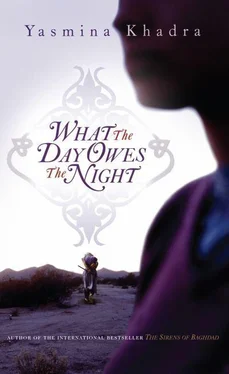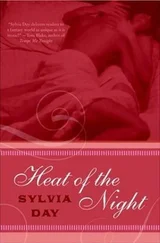Madame Scamaroni regularly took us to the apartment on the Boulevard des Chasseurs in Oran, but I have no memory of the movies we saw or the girls we met. Simon was getting tired of my distracted state. One day, on the beach, he tipped a bucket of water over me to get my attention. If Jean-Christophe had not been there, the joke would have turned into a brawl.
Worried by my sudden change of mood, Fabrice came to my house to ask me what was wrong. He got no answer.
Finally, tormented by the waiting, I jumped on my bicycle one Sunday at midday and raced down to the white house. Madame Cazenave had hired an old gardener and a housekeeper, and I found them having lunch together in the shade of a carob tree. I waited in the courtyard, clutching my bicycle, trembling from head to foot. Madame Cazenave gave an imperceptible start when she saw me standing by the fountain. She glanced around for the servants, saw that they were at the far end of the garden, turned back to me. She stared at me in silence; behind her smile, I could tell she was furious.
‘I couldn’t wait,’ I said.
She came down the small flight of steps and walked towards me.
‘But you have to,’ she said firmly.
She beckoned me to follow her back to the gates, and there, without worrying whether it was indiscreet, as though we were the only two people in the world, she slipped her arms around my neck and kissed me hard. The passion of her kiss was such that I knew that this was the end, that this was goodbye.
‘You were dreaming, Jonas,’ she said. ‘It was just a young man’s dream.’
She took her arms from round my neck and stepped back.
‘Nothing ever happened between us, not even this kiss.’
Her eyes forced me to retreat.
‘Do you understand?’
‘Yes, madame,’ I heard myself mumble.
‘Good.’
She patted my cheek, a brisk, maternal gesture.
‘I knew you were a sensible boy.’
I had to wait until it was dark before I went home.
I HOPED for a miracle; it never came.
Autumn arrived, stripping the trees of their leaves, and I realised I had to face facts. It had all been a dream. Nothing ever happened between Madame Cazenave and me.
I went back to my old life, to my friends, to Simon’s antics and Fabrice’s feverish idealism. Jean-Christophe had found a way of dealing with the demanding Isabelle Rucillio. With any compromise, he would say, the important thing was to make sure you got something out of it. Life was a long-term investment, he insisted, and fortune smiled on those who played the long game. He seemed to know what he wanted, and if his theories came unburdened with any actual proof, we were more than happy to take him at his word.
With 1945 came a stream of contradictory stories and rumours. Gossiping over a glass of anisette was the favoured pastime in Río Salado. The smallest rumour would be wildly exaggerated, embellished with daring feats attributed to people who for the most part had nothing to do with it. Everyone on the café terraces had a theory about the war. The names Stalin, Roosevelt, Churchill rang out like trumpets announcing the final assault. One joker, noting that General de Gaulle looked undernourished, suggested sending him a fine Algerian couscous to fatten him up, thereby making it easier for us to trust him, since Algerians invariably associate power with a pot belly. Everyone laughed and drank, then went on drinking until every passing donkey looked like a unicorn. The mood was optimistic. Jewish families who had left the town when news came of the mass deportations in France began to return home. Slowly, surely, things were getting back to normal. The grape harvest had been exceptional and the end-of-season ball was glorious. Pépé Rucillio married off his youngest son, and for seven days and seven nights the whole district rang to the sound of the guitars and castanets of a famous troupe of troubadours shipped in from Seville. We were even treated to an extravagant display in which the finest horsemen in the region were pitted against the greatest warriors of the Ouled N’har.
In Europe, the Third Reich was crumbling. Newsreels predicted that the war would soon be over, even as the bombing intensified: whole cities vanished in flames and ashes, the sky was black with the smoke of aerial battles, trenches collapsed beneath the caterpillar treads of advancing tanks. The cinema in Río Salado was constantly full of people who only came to watch the Pathé News they showed before the main feature. Allied troops had liberated great swaths of occupied territories and were now marching relentlessly on Germany. Italy was a shadow of its former self. The Resistance and the partisans were inflicting heavy losses on Nazi troops caught in a vice between the Red Army and the advancing American forces.
My uncle, wearing the thick jumper that hid his increasingly emaciated frame, sat glued to the wireless, never moving from his chair. From morning to night he sat turning the dial of the radio, trying to tune to some station without interference. Over the whine and static of the airwaves, the house hummed with news and speculation. Germaine had given up on her husband, allowing him to do exactly as he pleased. My uncle insisted on having his dinner served in the living room by the wireless, so that he didn’t miss a scrap of news.
As 8 May 1945 dawned, and the whole world celebrated the end of their nightmare, in Algeria a new nightmare appeared, devastating as a plague, monstrous as the Apocalypse itself. Popular celebrations turned to tragedy. In Aïn Temouchent, near Río Salado, marches for Algerian independence were brutally suppressed by the police. In Mostaganem, riots spread to the surrounding villages. But the horror reached its height in the Aurès and in the Constantine province, where the police, aided and abetted by former colonists turned militiamen, massacred thousands of Muslims.
‘I can’t believe it.’ My uncle’s voice quavered as he sat trembling in his pyjamas. ‘How could they? How could they murder people who are still mourning children who died fighting for the freedom of France? Why should we be slaughtered like cattle simply for demanding our own freedom?’ Pale, distraught and haggard, he shambled up and down the living room in his slippers.
The Arabic radio station reported the bloody suppression of Muslims in Guelma, Kherrata and Sétif, the mass graves where thousands of corpses lay rotting, the Arabs hunted by packs of dogs through vineyards and orange groves, the lynchings in the village squares. What was happening was so horrific that my uncle and I did not even dare to join the peaceful demonstration down the main avenue of Río Salado.
This savage, bloody cataclysm left the Muslim population of Algeria in mourning and almost killed my uncle. One night as he listened, he suddenly brought his hand up, clutched at his chest and collapsed. Madame Scamaroni drove us to the hospital, where we left him in the care of a doctor he knew and trusted. Germaine was distraught, and Madame Scamaroni offered to stay with her. Jean-Christophe and Fabrice came round and waited with us late into the night. Simon borrowed his neighbour’s motorbike so he could come too.
‘Your husband has had a heart attack, madame,’ the doctor explained to Germaine. ‘He’s still unconscious.’
‘Is he going to pull through?’
‘We’ve done everything we can; the rest is down to him.’
Germaine did not know what to say. She had barely uttered a word since we arrived at the hospital. Her face was pale, her eyes haunted; she clasped her hands and bowed her head in prayer.
At dawn the next day, my uncle regained consciousness, asked for a drink of water, and demanded he be discharged immediately, but the doctor insisted on keeping him under observation overnight. Madame Scamaroni offered to pay for a nurse so that my uncle would have full-time care, but Germaine politely declined. She thanked Madame Scamaroni for everything she had done, but insisted that she would look after her husband herself.
Читать дальше












